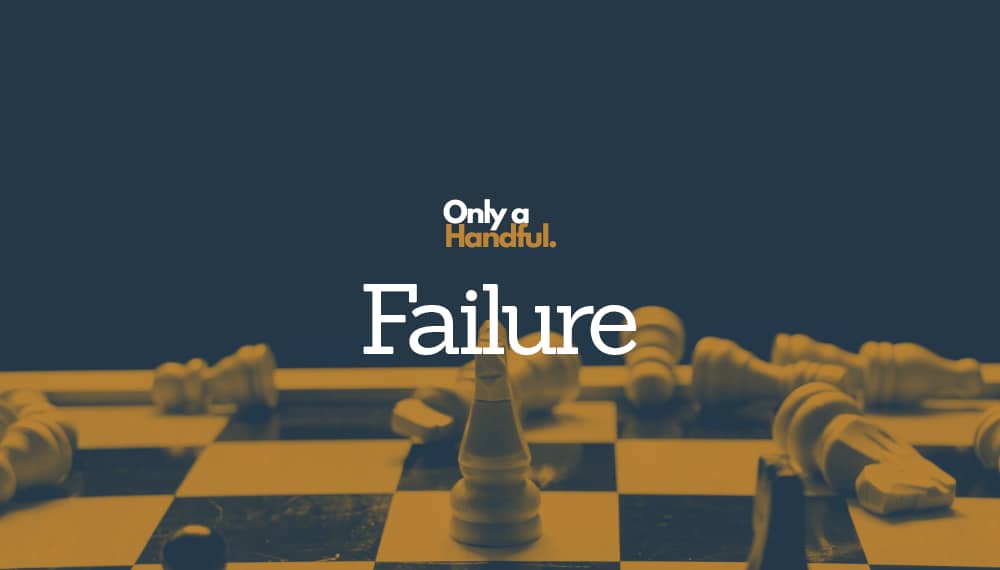When I was in high school back in Iloilo City, our school required that we take quizzes for every subject everyday. That's 8 quizzes a day, one at the start of every class. 8 quizzes a day multiplied by around 200 school days in a year totals to about 1,600 quizzes a year. With a passing score set at 75%, it's not difficult to see it as 1,600 chances to fail. To make matters worse, it was imperative that we show our parents our grades at least every week - our teachers would check for their signatures on every graded quiz.
My mom took charge of signing all my quiz notebooks, but every time I got a failing grade, she would show my dad as well. And his response was always the same: "Bawi lang." Soon enough, it became clear to me. What seemed to be the daunting 1,600 chances to fail were also 1,600 chances to "bawi lang." I still remember the moment I shifted to this perspective. From then, every passing grade became an "I can do better tomorrow" and every failing grade became a "bawi lang tomorrow."
But in the real world, it's never as simple and as structured as 8 quizzes everyday, so sticking to this mindset is consequently more difficult. In the middle of a bad day, for instance, it's easy to forget that it's just 1 out of 365 in a year. But again, with 365 days come 365 chances to "bawi lang" and to do better, because a failure today does not mean a failure tomorrow.
Mythbusters co-host Adam Savage would say, "failure is always an option." And it often is. It's not always the best option but no failure is ever final unless we allow it to be.
This is a handful on failure as tragedy, motivation, fear, and creativity.
1. Failure as Motivation: Do what you can't, a film by Casey Neistat
Failure is someone telling you that you can't do something because you're not good enough, or not talented enough, or not old enough, or not experienced enough, and believing it. Failure then means succumbing to the idea of failure itself. It is the ultimate motivation to succeed.
I've already used one of Casey Neistat's films in a previous list but they're just too good not to share. This is Neistat on doing what you can't.
You don’t have to listen to anyone because in this new world, no one knows anything.
The haters, the doubters, are all drinking champagne on the top deck of the Titanic and we are the f***ing iceberg.
2. Failure and Reality: A quote from Peter Thiel
Peter Thiel is the co-founder of PayPal, a venture capitalist, entrepreneur, and author. I struggle with his quote below, because it's a 180-degree turn from my own views on failure, but I know there's a lot of truth to it, too.

"I think failure is massively overrated. Most businesses fail for more than one reason. So when a business fails, you often don’t learn anything at all because the failure was overdetermined. You will think it failed for Reason 1, but it failed for Reasons 1 through 5. And so the next business you start will fail for Reason 2, and then for 3 and so on.
I think people actually do not learn very much from failure. I think it ends up being quite damaging and demoralizing to people in the long run, and my sense is that the death of every business is a tragedy. It’s not some sort of beautiful aesthetic where there’s a lot of carnage, but that’s how progress happens, and it’s not some sort of educational imperative. So I think failure is neither a Darwinian nor an educational imperative. Failure is always simply a tragedy.”
On one hand, I disagree with Thiel when he says that we do not learn much from failure because the truth is, we can learn much from any success, failure, or experience so long as we're open to it. Truly, every new venture is different and we can never know for sure if a failure now would give us better answers to the questions that come next. However, in some ways, these failures were necessary steps to take us to where we are now. Although specific lessons don't always carry over to the next problem, they build resolve and grit, so we're ready for the next one.
On the other hand, I do agree with Thiel in that over-romanticising failure won't help. We still want to win and losing still sucks; a "tragedy," as Thiel puts it. And although there is no escaping it, the point is not to go and seek out failure from the get-go but to accept it when it happens and move on from it.
Contemplating whether failure is a good thing or a bad thing is tricky because it is never just one or the other. So we should treat failure as it is, a failure. It is a loss, a mere step in the process, and never the end in itself.
3. Failure as Creativity: The Importance of Failure, a rant by Jason Silva.
No, failure is never the end but it is a detour, a ride we all take. Jason Silva is a speaker, host, and filmmaker. In his films, Silva takes himself on a journey of thought by channeling his "flow state" and thinking out loud. His on-the-spot freestyle rap/speech takes us on the ride with him. This is him riding his thoughts on failure and creativity.
Most of the time, we play it safe. We map out what we’re gonna say. We pre-plan what we’re gonna do. We make a list, we have a set of steps, we are prepared, we pre-scripted our speech. We are responsible. We’re not going into a situation blind.
But again, once in a while, my friends, we need to be willing to make a mistake, we need to be willing to fail.
It is only when we risk making a mistake that we might find ourselves improvising, inventing, innovating our way back to where we want to get to.
4. Failure as Fear: Why you will fail to have a great career, a TED Talk by Larry Smith
This talk reminds me of a J.K. Rowling quote: “It is impossible to live without failing at something, unless you live so cautiously that you might as well not have lived at all - in which case, you fail by default.” It is one thing to fail to do something. But to fail to make the choice out of fear, I think, is the worst choice there is.
Larry Smith is an economist, professor, and the Founding Director of the Problem Lab, an organization solely dedicated to identifying and understanding important problems. This is his talk on why we fail to have great careers.
You're going to fail, because -- because you're not going to do it, because you will have invented a new excuse, any excuse to fail to take action.
5. Failure and Shame: A Reason Not to Worry What Others Think by School of Life
No one wants to fail and it's not only because failure is unsatisfying and demoralizing in itself, but it's also because of the perceived judgment that results from it. Every setback, delay, and mishap is at center stage in our minds as it occurs, so our brain tricks us into thinking that it's at center stage in everyone else's minds as well. In reality, we're never at the center of the universe despite all our shortcomings, but we think the whole world has its eyes on our every misstep. And because of this, our failures hurt more than they should.
This is the School of Life with an analysis of the painting Landscape with the Fall of Icarus and why we shouldn't care about what others think of our failure.
It is one of the central sources of our unhappiness that we spend so much of our lives fearing for our reputations and wondering what other will think of us when we fail, as we inevitably will.
We lie awake at night wondering how we could cope without the approval of people we don’t even like very much. We surrender our freedoms to the verdicts of strangers.
Also published on Medium.

